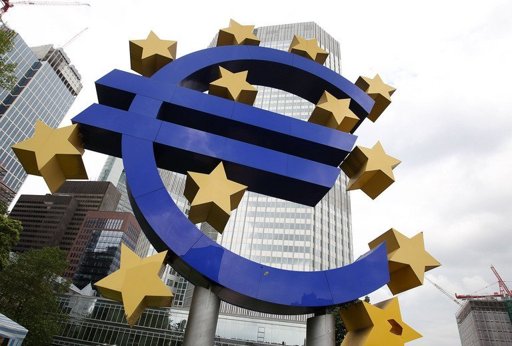Fears of possible deflation and the strength of the euro persuaded the European Central Bank to cut its key interest rates to all-time lows on Thursday.
The ECB cut its central "refi" or refinancing rate by a quarter of a percentage point to a new record low of 0.25 percent at its monthly policy meeting, it said in a statement.
While speculation of a possible rate cut had surged after eurozone inflation slowed unexpectedly to a four-year low of 0.7 percent last month, most ECB watchers had thought the bank would keep its gunpowder dry for the time being.
The central bank also trimmed another key rate, the interest rate on its marginal lending facility by 0.25 percentage point to 0.75 percent.
But it held the interest rates on its deposit facility at zero, instead of taking it into negative territory for the first time.
On the news, the euro fell sharply against the dollar..
At about 1245 GMT, the European single currency sank as low as $1.3354 -- the lowest level since September 18. That compared with $1.3505 just before the ECB's quarter-point rate cut.
ECB chief Mario Draghi is scheduled to explain the reasoning behind the move at a news conference later.
But economists admitted they were wrong-footed by the move.
"The ECB just surprised most analysts, including us, by cutting the refi rate by 25 basis points to now 0.25 percent," said ING DiBa economist Carsten Brzeski.
"Deflationary risks and the stronger euro seem to have motivated the ECB's move. It is obvious that the ECB under president Draghi has become much more pro-active than under any of his predecessors," the expert said.
IHS Global Insight economist Howard Archer also believed the decision to cut rates "is obviously the consequence of uncomfortably low and falling eurozone consumer price inflation."
The annual rate of inflation for the 17 countries that share the euro slowed unexpectedly to just 0.7 percent in October, the lowest rate in four years, raising fears the single currency area may tip into deflation -- a vicious circle of falling prices, wages and output.
But the ECB's mandate is for an inflation rate of "close to but just below 2.0 percent."
Draghi himself has always held the door open to further rate cuts, repeatedly stating in so-called forward guidance that the ECB's decision-making governing council "expects interest rates to remain at present or lower levels for an extended period of time."
Archer suggested that if the ECB had not reacted to the sharp slowdown in inflation "it could have led the markets to questioning how meaningful the ECB's forward guidance was."
But the strength of the euro and only sluggish economic recovery "also supported the case for lower interest rates," the analyst believed.
Many ECB watchers had been counting on a rate cut only in December, when the central bank would also publish its latest growth and inflation forecasts.
"The fact that the ECB chose to act now rather than wait until December ... suggests that the bank felt there was a compelling case for prompt action," Archer said.
He said it was unlikely that the latest cut will have a "major impact in boosting eurozone growth, (but) it may at least help keep the euro at a more competitive level and limit market interest rates," the analyst said.
|
The US economy grew 2.8 percent in the third quarter, much stronger than expected, the government reported Thursday. Analysts had expected the Commerce Department's first read on gross domestic product for the quarter would show growth at an annual rate of 1.9 percent from the second quarter. |




















































